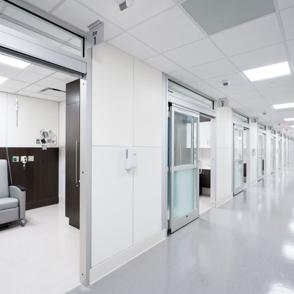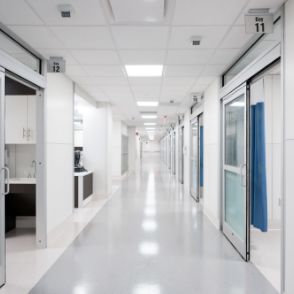Creating high-quality staff welfare facilities in healthcare settings is crucial for ensuring the well-being, productivity and retention of medical professionals.
High-quality staff welfare facilities contribute to a supportive work environment and directly impact patient care and operational efficiency.
We understand how important it is to provide spaces that go beyond basic functionality. Staff welfare facilities should inspire comfort, foster focus and offer adaptability for a variety of tasks – a quiet space to recharge, a place to hold virtual meetings or a multi-use area for team collaboration.
In this blog, we’ll explore the challenges current hospitals are facing, why it’s important to have good staff facilities, what makes these spaces effective and how our solutions support these needs.
The Current State of Staff Welfare Facilities
Despite their importance, many healthcare institutions face challenges in providing adequate staff welfare facilities. Common issues include outdated rest areas, insufficient private spaces for relaxation or focused work and a lack of modern amenities that support the diverse needs of healthcare professionals. These shortcomings can lead to increased stress, reduced job satisfaction and higher turnover rates among staff.
A study by the NHS Staff Council shows that improving staff welfare facilities can lead to better health outcomes for staff, reduced sickness absence and improved patient care. The report emphasises the need for suitable rest areas, access to healthy food options and environments that promote mental wellbeing.
Key Elements of Effective Staff Facilities
To create optimal staff welfare facilities, several key elements should be considered.
– Comfort: Providing ergonomic furniture and quiet areas for relaxation or focused work is essential. Comfortable environments help reduce stress and fatigue among healthcare staff.
– Functionality: Designing multipurpose spaces that accommodate rest, study and collaboration allows for efficient use of space and resources.
– Technology Integration: Equipping facilities with integrated power sources, data connectivity and virtual meeting tools supports the technological needs of modern healthcare professionals.
– Hygiene: Implementing easy-to-clean surfaces, proper ventilation and infection control measures ensures a safe and sanitary environment.
– Sustainability: Using energy-efficient designs and sustainable materials aligns with the NHS’ environmental goals and reduces operational costs.
Our Solutions:
We offer innovative modular solutions that address these key elements and enhance staff welfare facilities in healthcare settings.
– Comfort and Functionality: Our modular healthcare study pods provide quiet, private spaces designed for work, study and virtual meetings. These pods are quick to install and can be reconfigured to meet changing needs, offering both comfort and functionality.
– Technology Integration: The study pods come equipped with integrated data and power sources, ensuring that healthcare professionals have access to the necessary technological tools within their welfare facilities.
– Hygiene: Our modular solutions feature materials and designs that facilitate easy cleaning and maintenance, supporting infection control protocols essential in healthcare environments.
– Sustainability: Architectural Wallsz is committed to sustainability, using energy-efficient designs and materials that contribute to meeting net-zero carbon targets. Our off-site fabrication techniques reduce waste and promote environmental responsibility.
Here’s a Real-World Example…
The COVID-19 pandemic disrupted traditional education and training methods for healthcare staff with a shift from face-to-face interactions to virtual platforms. This transition highlighted a critical shortage of suitable facilities that could accommodate online meetings while adhering to social distancing and privacy requirements.
At New Cross Hospital, part of The Royal Wolverhampton NHS Trust, the existing library space was identified as under-utilised and presented an opportunity to repurpose it to better serve the evolving needs of staff and students.
To address this challenge, the first floor of the library was earmarked for refurbishment to create enhanced facilities. After evaluating several options, study pods emerged as the optimal solution to provide quiet study areas and support virtual meetings. In March 2022, nine study pods were installed in the refurbished first-floor environment, offering private, sound-insulated spaces equipped with necessary technological amenities.
The introduction of these study pods has been met with positive feedback from both staff and students. They have become particularly popular among students and clinical teaching fellows for activities such as interviews, online examinations and virtual meetings.
Improving Staff Welfare Facilities
Investing in well-designed staff welfare facilities is essential for the success of healthcare spaces. By enhancing staff welfare facilities, healthcare providers can create supportive environments that benefit both staff and patients.
To learn more about how our modular solutions can transform your healthcare space, get in touch with us today.






Sorry, the comment form is closed at this time.